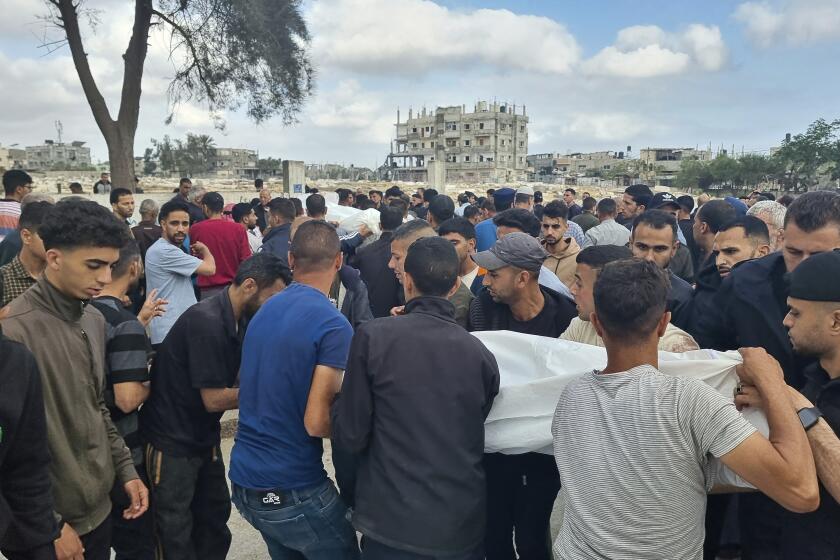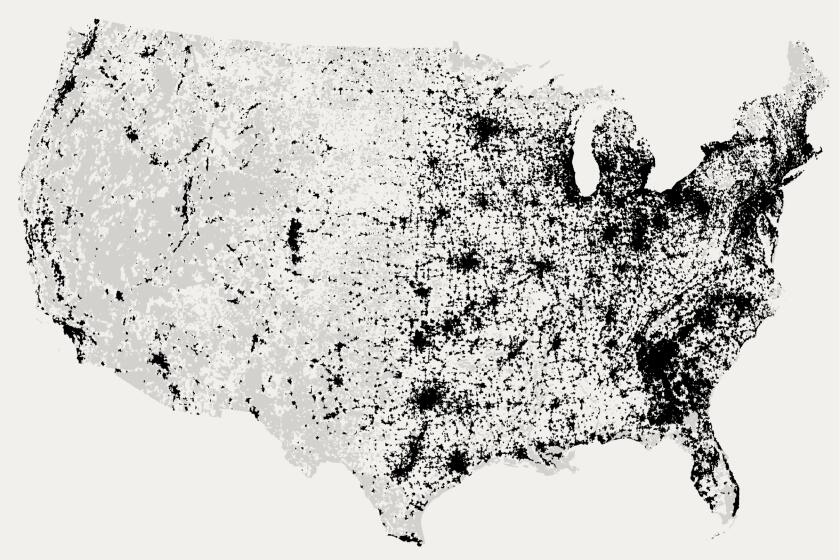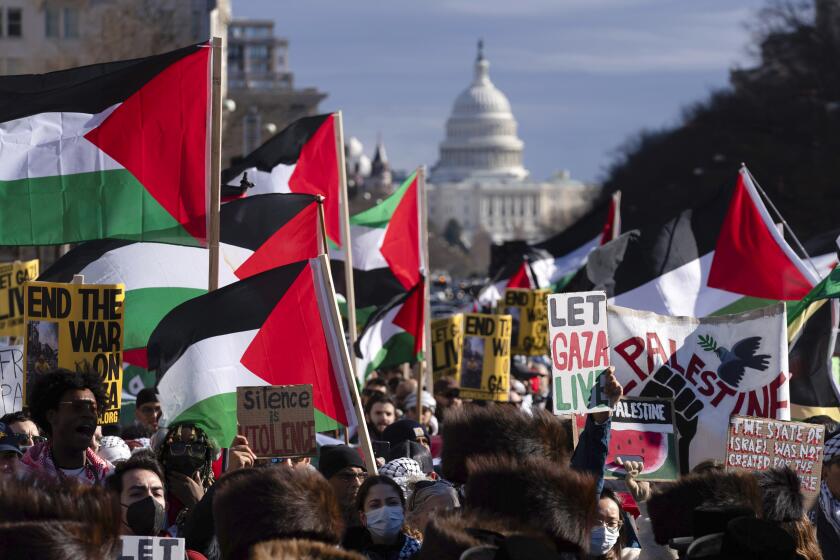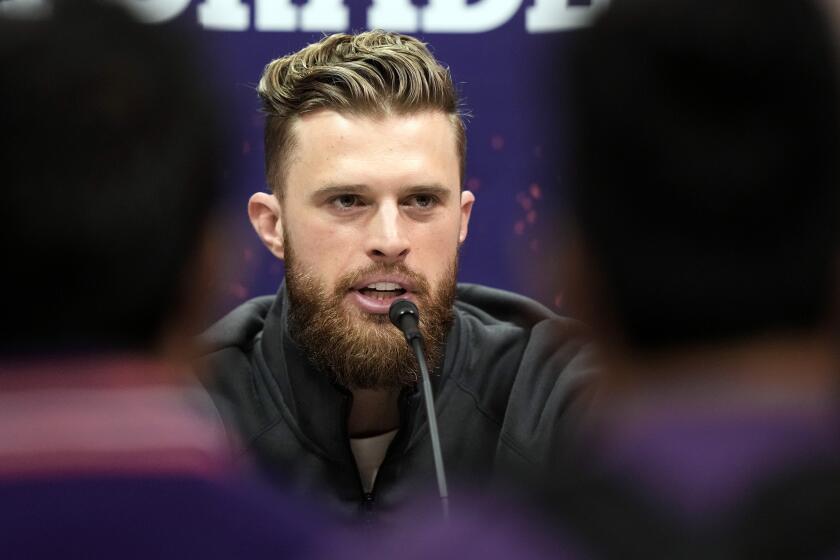Opinion: Since the Hamas attack, Israelis have begun arming themselves the American way

Among the core Israeli national narratives that have been fractured by the Hamas terror attacks and months of war and violence is the notion that Israel’s ethos on firearms differs from that of the United States.
Both countries can be characterized as gun-centric democracies, but according to the Israeli narrative, the U.S. is a land of too many guns and too few laws, while Israelis “trust their state, and don’t fear each other.” A common refrain emphasizes that in Israel, bearing arms isn’t a right, it’s a privilege.
After Oct. 7, in a shockingly fast turnaround, that privilege became, if not a right, an imperative. In changing Israel’s relationship with firearms, Benjamin Netanyahu’s government is also changing the nation in ways that could have profound and lasting implications.
Israeli Prime Minister Benjamin Netanyahu pledged to launch an incursion into the southern city of Rafah, where thousands of Palestinians are sheltering.
I have spent more than a decade collaborating with Israeli public health scholars and safety activists to better understand how a country with many guns could see only a fraction of U.S. civilian gun deaths.
Partner shootings, homicides, gun suicides, accidental shootings and mass shootings have been remarkably low in Israel in part because the government banned assault rifles for private citizens and issued handgun permits only after an extensive vetting process.
Effective gun laws reinforced social cohesion. If Americans carry guns based on individualized notions of self-protection, Israelis consider gun ownership a shared responsibility, and when gun policy comes up, they will explicitly say they “don’t want to be like the U.S.”
But like many national narratives, Israel’s gun scripts are partly myth. Armed settlers in the West Bank have recklessly intimidated and harassed Palestinians. A robust contraband arms market flourished in smaller cities, and the victims of those guns were overwhelmingly Arab citizens of Israel.
People across Gaza sent thanks to students protesting on U.S. campuses against Israel; Israeli leaders characterized the demonstrators as ‘pro-Palestinian mobs.’
Still, American researchers like me could view Israeli’s gun safety efforts as a model of successful public policy.
Now that model is at risk. Hamas’ kidnapping and slaughter of Israelis represents a catastrophic failure of state protection. It has tapped into deep national fears about being Jewish, vulnerable and exposed.
National Security Minister Itamar Ben-Gvir — an incendiary Jewish supremacist once expelled from army service because of radicalism — has seized the moment. Prior to the Hamas attacks, he tried to weaken gun permit regulations and ease carry rights, but his arguments failed to gain traction. Now, however, he and his allies have managed to fast-track legislation that has generated an unprecedented spike in armed Jewish civilians.
“Carry a Gun, It’s a Life-saver: Ben-Gvir and His Wife Boast of Dramatic Expansion in Israelis Carrying Weapons” read a headline in Haaretz on Oct. 22.
Within a week of the attack, the Netanyahu government was purchasing and distributing thousands of firearms. Contentious Knesset oversight committee meetings detailed how dozens of unqualified people — including Ben Gvir’s personal staff appointees — had been granted temporary authority to approve gun license applications. In March, according to Haaretz, Ben-Gvir celebrated the issuance of 100,000 new permits in five months.
::
It’s understandable that gun sales to civilians spike in times of peril. Guns provide real protection in some instances, and the promise of protection in others. And yet, gun safety and security are never as straightforward as the NRA’s “good guys” versus “bad guys” binary makes it seem. Armed civilians rarely prevent crimes such as mass shootings. Potential security benefits to arming civilians are often counterbalanced by rising everyday gun-related injury and death.
Gun ownership can make people wary of governments and regulations, and gun politics can also be tribalizing, divisive, even antidemocratic.
After the death of George Floyd and amid the pandemic in 2020, people’s fears, sometimes fed by conspiracy theories, pushed gun sales to record highs. Gun sellers could exploit white anxiety about Black violence and the anxieties of Black and Latino populations as well. Meanwhile, pro-gun courts in the U.S. have been overturning firearm safety laws put in place by state or local legislatures and voters.
Religious Zionists, most believing in a divine right to govern, now have outsize influence in Israel. The war in the Gaza Strip is energizing their settlement push.
The Middle East represents a profoundly different context. But Netanyahu’s government is doing more than responding to the traumatic chaos of the Hamas attacks by adopting U.S. gun laws: Ben Gvir’s gun policies paper over security lapses, weaken trust in democratic institutions, exacerbate divides and will do little to make anyone safer.
For instance, Israeli data show that shockingly few terror attacks are stopped by civilians with guns, and yet the government insists otherwise. Armed civilians, said Netanyahu, “save lives.” He initially shrugged off an incident in which a “hero” armed civilian, who had indeed stopped a deadly terrorist attack, was then himself shot to death in the chaos. “We might have to pay prices,” Netanyahu said, “but that’s life.”
It’s likely that disproportionate numbers of the newly distributed guns are ending up in the hands of supporters of Netanyahu’s conservative/religious coalition. Armed Jewish security squads have formed in mixed cities where both Jewish and Palestinian Israeli citizens live. Violence against Palestinians has escalated in the West Bank, where members of Jewish settler groups have long been allowed to carry weapons, while Palestinians have not.
::
What does it mean for Israel to so rapidly adopt American-style armed individualism?
In conversations last fall, Israeli Jewish and Palestinian clinicians, journalists, gun safety advocates and academics told me they’d been shattered by the Hamas attack and the plight of hostages. They understood their countrymen’s desire for firearms. At the same time, no one could believe how many guns were flooding in.
“People we never imagined are lining up for permits and carrying guns,” one activist said during a group Zoom conversation. Others on the call chimed in. “My husband.” “My grocer.” “My father-in-law.” “Me.”
Being “like the U.S.” emerged as a source of disquiet. One activist who lives in a Tel Aviv suburb spoke as sirens rang in the background. How long after the Gaza war ends, he wondered, “will it take until we see our first American-style mass shooting?”
An ER doctor told a story about bickering neighbors holding up guns mid-argument. She asked a question that months before would have been unimaginable: “Do you think U.S. gun safety groups might be willing to take up our cause?”
The Los Angeles Times spent months researching and analyzing firearms dealer and gun violence data for its recent series on gun access. Here’s what we found.
The “gun drive is running roughshod over democratic procedures,” a leading peace activist said, with “rising authoritarianism” and “a trajectory of increasingly violent police responses against antiwar protesters.”
Later, as the human catastrophe in Gaza spiraled, another activist asked, “What violence is being done in our name?”
By January, with protests against the war accelerating, a journalist wondered whether disarmament would be possible, with Israelis “under siege, not just by our enemies but also by the supposedly liberal, modern people in the West who we thought we were part of.” Would it be possible to imagine or “do peace”?
::
The proliferation of guns in Israel that began as a response to an external threat has become an enforcer of expansive internal agendas. “I don’t really think Ben-Gvir wants Israelis to feel safe,” a Palestinian Israeli lawyer explained. “He wants settlers and crazies to intimidate others.”
The gun safety movement is mobilized in opposition, but however its efforts evolve, the decisions Israel has already made about guns could go a long way toward shaping the future of the nation.
Perhaps the country will overturn Ben-Gvir’s disastrous gun policies and begin the hard work of countering their polarizing health, social and political effects. Such an approach would require regional stability, and the renewal of what Haaretz calls “the contract between state and citizen.”
Or Israel could remain a fortress, its people adopting “stand your ground” self-defensiveness and arming themselves in ever more anticipation of real and speculative threats.
If I’ve learned anything from studying gun politics in the U.S., it’s that an armed and internally divided nation is less able to negotiate, effectively legislate or meaningfully compromise.
Jonathan M. Metzl (@jonathanmetzl) directs the department of medicine, health and society at Vanderbilt University and is the author, most recently, of “What We’ve Become: Living and Dying in a Country of Arms.” This article was produced in partnership with Zócalo Public Square.
More to Read
A cure for the common opinion
Get thought-provoking perspectives with our weekly newsletter.
You may occasionally receive promotional content from the Los Angeles Times.










